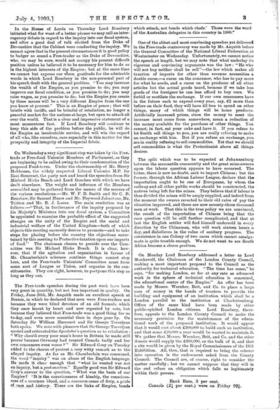The Free-trade speeches during the past week hare been very
great in quantity, but not less important in quality. On Friday, June 26th, Mr. Asquith made an excellent speech at Boston, in which he declared that men were Free-traders not because they were blind devotees of an old formula which they once learnt by heart and now repeated • by rote, but because they believed that Free-trade was a good thing for us to-day, and even more essential than in days gone by. On Saturday Sir William Harcourt and Sir George Trevelyan both spoke. We note with pleasure that Sir George Trevelyan quoted and reiterated the Speciator's question as to retaliation : "Why should every poor man's home in Britain be made still poorer because Germany had treated Canada badly and her own consumers even worse P" • Sir Edward Grey on Tuesday added to the chorus of protest a very witty remark as to the alleged inquiry. As far as Mr. Chamberlain was concerned, the wort]. "inquiry" was an abuse of the English language. He made it clear enough that "what he wanted was not an inquiry, but a post-mortem." Equally good was Sir Edward Giey's. answer to the question, "What was the basis of our Empire? 'It is the consciousness of kinship, the conscious- ness of a common blood, and a common-sense of duty, a pride of -race and history. These are the links of Empire, bond*
which attach, not bonds which chafe.' Thom were the word of the-Australian delegates in this country in 1900."










































 Previous page
Previous page